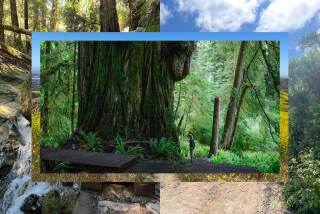Bankrupt Firm Allegedly Kept State Park Fees
SACRAMENTO — A private company whose bankruptcy threw California’s park reservation system into turmoil has failed to turn over nearly $1 million in state fees it collected from campers and visitors, records show.
The attorney general has begun a preliminary inquiry into the loss of funds, which officials say the cash-strapped state parks system can ill afford.
The company, Destinet Service Corp. of San Diego, is already under investigation by the federal inspector general’s office for allegedly keeping hundreds of thousands of dollars in reservation fees collected for the National Park Service.
The company’s financial problems have caused disruptions in parks throughout California and the nation as thousands of vacationers have been unable to get reservations for campgrounds and special tours.
Ken Colombini, a spokesman for the California Department of Parks and Recreation, said Destinet stopped paying any money to the state from Sept. 20 to Oct. 22, although it continued collecting fees from thousands of vacationers for reservations at state campgrounds and tours at Hearst Castle.
On Oct. 22, when the company formally declared bankruptcy, payments to the state were resumed under court order, but officials said the $944,726 that Destinet had collected in the one-month period was never repaid.
“We are working with the attorney general. Our audit office is looking into it,” Colombini said. “But it’s kind of early to make any kind of assertions about what’s happened to these funds.”
Jeffrey Isaacs, the San Diego lawyer who represents Destinet in the bankruptcy proceedings, said that the amount owed to the state is not in dispute and that the parks department’s claim is one of the largest pending in the case. The matter, he said, is in the hands of a bankruptcy trustee.
The state is being represented in the bankruptcy case by Atty. Gen. Dan Lungren, whose office is also investigating why the money was not turned over to the parks department.
“We’re reviewing the best way to recover the taxpayers’ money,” said deputy press secretary Staci Turner. “It’s our intention to aggressively pursue the money.”
The disclosure of the loss of funds comes less than two weeks after Destinet formally closed its doors, forcing the state to shut down its reservation system. Since then, campers--as well as visitors to Hearst Castle at San Simeon and Ano Nuevo State Reserve south of Half Moon Bay--have been handled on a first-come, first-served basis.
Destinet, which has provided reservation services for the parks system since 1994, annually handles about 1 million calls and collects fees for campgrounds and tours totaling $20 million. The company receives $6.75 for every reservation made. With 264 parks, preserves and historic sites, California’s park system accommodates about 73 million visitors a year.
In October, the National Park Service canceled its contract with the company to provide reservations for two of its tours--Mammoth Cave in Kentucky and the Frederick Douglass Historic Site in Washington--and campgrounds at 16 national parks, including Yosemite, Death Valley, Joshua Tree and Sequoia-Kings Canyon.
The Park Service said the company had defaulted on the contract by “retaining hundreds of thousands of [Park Service] dollars.”
Cindy Daly, a spokesman for the National Park Service, said the agency could not disclose the exact amount owed to the federal government as long as the case was under investigation by the inspector general.
Meanwhile, federal parks, like state parks, were not accepting reservations. Campgrounds and tours were being made available only on a first-come, first-served basis.
At Yosemite, Park Ranger Kendell Thompson said that so far, no one has been turned away. “We’re lucky, this is not our peak camping season at all,” he said.
At Hearst Castle, tour operators were issuing tickets by hand because the computer system that normally prints them was shut down when Destinet closed its doors.
Even so, spokesman Jim Allen said, the state was able to handle the peak holiday traffic without delays by asking seasonal employees to work extra hours.
State and federal officials said they hoped to install new reservation systems by early spring, one of the peak times for making summer reservations.
The state has already contracted with another firm, Park.Net, to provide reservation services, but the installation of its system was delayed when Destinet challenged the contract in court.
A Sacramento judge issued a temporary restraining order prohibiting the state from putting the contract into effect, then lifted the order last week after the state argued that Destinet was no longer able to provide the service.
Darryl Young, chief consultant for the state Senate Natural Resources Committee, said he is concerned that the department allowed Destinet to go so long without paying fees owed to the state.
But Colombini said the state did not want to cancel the contract because it had no reservation system that could replace it.
More to Read
Sign up for Essential California
The most important California stories and recommendations in your inbox every morning.
You may occasionally receive promotional content from the Los Angeles Times.









